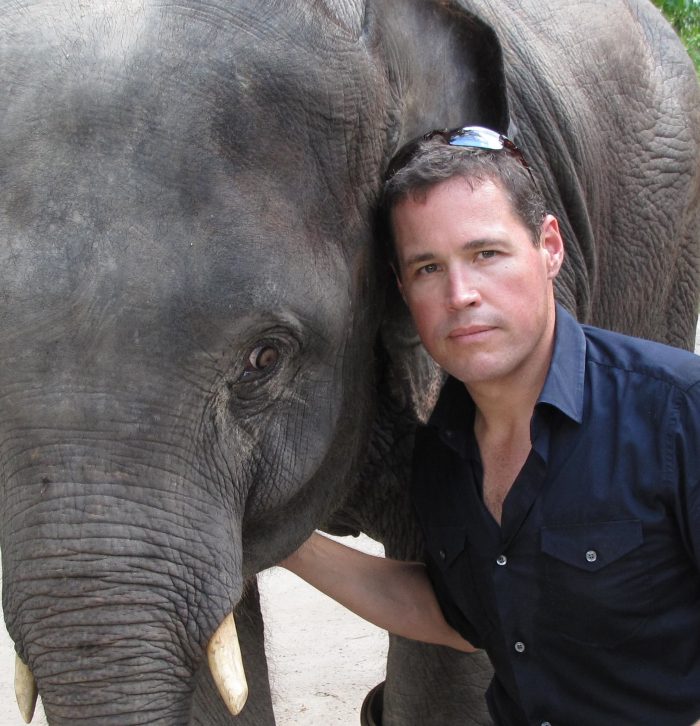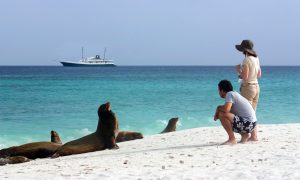Jeff Corwin initially rose to fame as a TV host in the late ‘90s, first on the Disney Channel’s Going Wild With Jeff Corwin and later on the Animal Planet shows Jeff Corwin Experience and Corwin’s Quest.
But Corwin also walks the walk of protecting wildlife off screen as well. He’s got a Bachelors degree in bachelor of science degrees in Biology and Anthropology, a Masters in Wildlife & Fisheries Conservation, an honorary doctorate in public education, and a history of working with the United Nations Environmental Program that dates back to his teens.
 For the past five years he’s been focused on hosting and executive producing ABC’s Ocean Mysteries with Jeff Corwin, which won a Daytime Emmy Award for Outstanding Travel Program in 2014. Later this year he’ll also be giving enriching lectures and accompanying Serengeti National Park game drives for two International Expeditions Tanzania safaris.
For the past five years he’s been focused on hosting and executive producing ABC’s Ocean Mysteries with Jeff Corwin, which won a Daytime Emmy Award for Outstanding Travel Program in 2014. Later this year he’ll also be giving enriching lectures and accompanying Serengeti National Park game drives for two International Expeditions Tanzania safaris.
We recently spoke with Corwin about his early interest in wildlife conservation, his love of Tanzania, and what he enjoys most about interacting with nature-lovers.
How did you originally fall in love with animals and nature?
I’ve always been a nature buff. When I was five years old I made a make-shift nature museum in the apartment building where we lived in Massachusetts. As soon as I could get out into the wilderness, that was the catalyst that inspired my love for nature and wildlife. Growing up and seeing the poor relationship people had with the wildlife around them inspired my interest in conservation.
When you went to the University of Massachusetts, you primarily focused on bats and snakes. What fascinated you about them?
The snake was the first wild creature I ever saw. I don’t know if it was the influence of seeing something like that so young, but I knew I’d be studying snakes for the rest of my life. By the time I worked my way through college, I’d become very strong with field experience, life experience and then an education in biological sciences. I further developed that in graduate school, where I did graduate work in bats. I felt that these creatures were misunderstood, and also important. It all sort of came to a head when I went to graduate school.
- Jeff Corwin with sea turtle
Good people make bad decisions because they lack good information. My interest [in doing TV] was to inspire them to understand and protect this world. When I started with my first series in 1997, it was a big leap for Disney to build a show around a guy who likes snakes.
There are people who watched my show as kids and are now adults! I still feel like that 27-year-old kid in the jungle. But you’re reminded of how old you are when you see someone in their twenties who just got their Veterinary degree, and they’re telling you they became a vet partially because of the experiences they had with you on TV when they were growing up. So I think people are becoming much more aware of these environmental issues, and care more about them than they did 20 years ago.
Later this year you’re giving lectures and accompanying game drives on two International Expeditions trips in Tanzania. What is it about Tanzania that makes it a special place for you?
I wanted to pick a place that both guests and I would enjoy. I love Tanzania – the Ngorongoro Crater, the Serengeti, Zanzibar… East Africa provides an iconic, culturally rich and naturally dynamic experience that is truly unrivaled. If it’s done right, you can not only get a feeling for the conservation challenges Africa is currently facing, but you also get this timeless experience of how it hasn’t changed for millennia.
You see these charismatic creatures moving by the thousands during the Great Migration, but then you also see issues with water and climate change and species exploitation, which will give you the information to empower you to be a part of the solution.
What do you get out of this hands-on, face-to-face interaction with travelers who clearly care deeply about nature and wildlife?
I’m very fortunate because, when I do these experiences, I often get to get out of the Range Rover/Land Cruiser and do something that a lot of folks couldn’t do. I get to help collar a lion, or track a poacher, or move a rhino out of harm’s way to a sanctuary. Those experiences I’ve had as a conservationist and television presenter have provided me with an understanding that I get very excited about sharing with people. Whether I’m on that game drive with you, or whether it’s an intimate lecture in the evening about how a Dung Beetle is vital to the web of life in this environment, how the venom of a Black Mamba works, or the energy infusion that comes with a generation of protein-packed antelope in the ecosystem, I get very excited about sharing that experience.
I’ll never forget the first time I went to East Africa in my early twenties, and then going back as a television presenter many times. Every time I go there, it brings something new and something great. It never gets old. So I’m really excited about sharing my passion and the inspiration I’ve gotten from East Africa with International Expeditions’ travelers.
There are obviously a lot of people who care about conservation and want to make a positive difference in the world. What can the average person do to help?
I think the greatest threat to conservation is a sense of being void of power. The most important step is to recognize your power as a consumer and your civic power within your community. It truly begins in your backyard– a local river, a local ecosystem, a regional species that’s in trouble. It is your responsibility to be a good steward.
We lose an entire species from our planet approximately every 20 minutes. Ultimately, the world we inhabit today, we’re not just inheriting it from our ancestors. We’re also borrowing it from our children.
See the Serengeti with Jeff Corwin!
Enjoy your own Jeff Corwin experience on a Tanzania Safari with International Expeditions in 2016! Discover East Africa’s quintessential wildlife frontier – a landscape brimming with the “Big Five” as well as a colorful host of birdlife – all while accompanied by this true champion of environmental, conservation and preservation issues.


